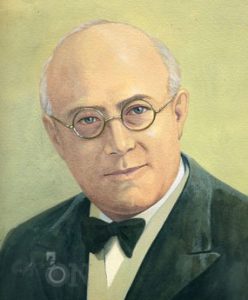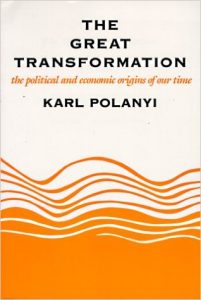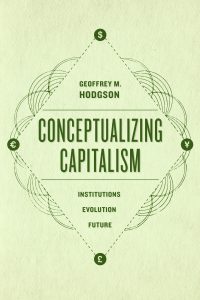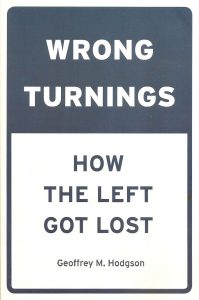
Geoffrey M. Hodgson
Karl Polanyi (1886-1964) was a Hungarian-born social scientist of major importance. His most famous and influential work is The Great Transformation, published in English in 1944. Especially since the economic crash of 2008, Polanyi has been cited as a key critic of the ‘market economy.’
 Polanyi has been repeatedly cited by popular academics and journalists including Paul Mason, Mariana Mazzucato and George Monbiot. Polanyi’s work is said to be of great contemporary significance, with major implications for current economics and politics.
Polanyi has been repeatedly cited by popular academics and journalists including Paul Mason, Mariana Mazzucato and George Monbiot. Polanyi’s work is said to be of great contemporary significance, with major implications for current economics and politics.
Polanyi argued in The Great Transformation (GT) that, for much of human history, economic activity has been governed by non-market principles, notably reciprocity (voluntary cooperation and the informal exchanges of favours) and redistribution (the use of levies or taxes for communal projects and to help individuals in need).
According to Polanyi, these longstanding mechanisms of economic operation were deeply disrupted in England in the late eighteenth century, with the growth of markets and the increasing use of monetary valuation. In particular, markets for land and wage labour played an increasingly significant role, tearing apart the fabric of society.
The alleged nature of ‘the great transformation’
Polanyi made a number of observations on this ‘great transformation’:
-
Human motives and objectives were transformed:
‘The transformation implies a change in the motive of action on the part of the members of society: for the motive of subsistence that of gain must be substituted. All transactions are turned into money transactions …’ (GT p. 41)
-
To work effectively a market system must be free of state and other interference:
‘the most startling peculiarity of the [market] system lies in the fact that, once it is established, it must be allowed to function without outside interference.’ (GT p. 41)
The ‘market economy implies a self-regulating system of markets … it is an economy directed by market prices and nothing but market prices.’ (GT p. 43)
-
But allowing the market system to operate fully results in the destruction of social bonds:
‘the idea of a self-adjusting market implied a stark utopia. Such an institution could not exist for any length of time without annihilating the human and natural substance of society … To allow the market mechanism to be the sole director of the fate of human beings and their natural environment … would result in the demolition of society.’ (GT pp. 3, 73)
-
Consequently, policy-makers were obliged to intervene to regulate markets dealing in labour, land and money:
‘Social history in the nineteenth century was thus the result of a double movement … While on the one hand markets spread all over the face of the globe and the amount of goods involved grew to unbelievable proportions, on the other hand a network of measures and policies was integrated into powerful institutions designed to check the action of the market relative to labour, land, and money. … Society protected itself against the perils in a self-regulating market system …’ (GT p. 76)
-
The state was necessarily involved in the creation as well as the regulation of the market system:
‘There was nothing natural about laissez-faire; free markets could never have come into being merely by allowing things to take their course … laissez-faire itself was enforced by the state. … The road to the free market was opened and kept open by an enormous increase in continuous, centrally organized and controlled interventionism. … [T]he introduction of free markets, far from doing away with the need for control, regulation and intervention, enormously increased their range. Administrators had to be constantly on the watch to ensure the free workings of the system.’ (GT pp. 139-41)
Problems and inconsistencies
Many have sympathized with Polanyi’s concern about the potentially destructive, destabilizing or debasing effects of an unleashed market economy. There are limits to commodification and markets. But as a careful reading of the above quotations shows, there are some problems and inconsistencies in Polanyi’s argument.
The first problem is that Polanyi sides with extreme, free-market economists who argue that the market is ‘self-adjusting’ or ‘self-regulating’ and always works best when there is no state interference (see claim 2 above).
By contrast, there is a long tradition in (both mainstream and non-mainstream) economics that has shown why markets are not self-regulating and intervention is required. Consider the writings of a multitude of writers including Arthur Pigou, John Maynard Keynes, Paul Krugman and Joseph Stiglitz. Their reasons include externalities, information problems, transaction costs, insufficient effective demand, and so on. Consequently, markets require some regulation or other intervention to work well.
 The second problem is that Polanyi (like many mainstream economists) pays insufficient attention to the fact that markets require institutions such as property, contract law, a legal system of enforcement, regulation of standards and so on. Consequently, as I argue at length in my book Conceptualizing Capitalism, a modern market economy requires a state, to constitute as well as to maintain a modern market system.
The second problem is that Polanyi (like many mainstream economists) pays insufficient attention to the fact that markets require institutions such as property, contract law, a legal system of enforcement, regulation of standards and so on. Consequently, as I argue at length in my book Conceptualizing Capitalism, a modern market economy requires a state, to constitute as well as to maintain a modern market system.
The third problem is that Polanyi is inconsistent. The fifth observation in the preceding section – making the important point that ‘laissez-faire itself was enforced by the state’ and required regulators ‘constantly on the watch’ to make it work – undermines the second claim that the market is ‘self-adjusting’ or ‘self-regulating’.
The fifth observation is valid and important in my view, but can be strengthened by an appreciation that the state and other institutions are required to constitute, and not simply to regulate, a modern market economy.
When writers such as Mason and Mazzucato refer to Polanyi, they typically refer to the important claim that the market requires the state to survive, but they overlook Polanyi’s repeated contradictory statements that the market must be ‘self-regulating’ in order to work.
Such writers rightly refer to the limits to markets and the possibility that they can undermine other beneficial social relations, but they often ignore the fact that Polanyi, as I shall explain below, wanted to get rid of real markets altogether.
Cherry-picking some statements from Polanyi but ignoring others is not good scholarship.
More havoc – Polanyi on commodities
Despite its insights, Polanyi’s book is confused and lacking in rigour. I go into more detail on this in an article I published on Polanyi in the Review of Social Economy in 2017. As an example, consider his concept of a commodity. Polanyi wrote that:
‘Commodities are here empirically defined as objects produced for sale on the market … labor, land, and money are obviously not commodities’ (GT p. 72).
But a few pages before, Polanyi had written:
‘Self-regulation implies that all production is for sale on the market and that all incomes derive from such sales. Accordingly, there are markets … not only for goods (always including services) but also for labor, land, and money’ (GT p. 69).
A few pages later Polanyi again admitted that labour could be bought and sold: ‘No market economy was conceivable that did not include a market for labor.’ (GT p. 77)
Polanyi again contradicted his claim that labour was not a commodity: ‘The mechanism of the market was asserting itself and clamoring for its completion: human labor had to be made a commodity’ (GT p. 107).
This is a major confusion. If labour by definition is not a commodity then it cannot be made into one. Polanyi’s definition of a commodity is also unclear: does ‘produced for sale’ mean ‘intentionally produced for sale’? Even here there is a problem, because reclaimed land, slaves and money can be intentionally produced for sale.
What Polanyi might have been trying to get at was that labour, land and money are different from other commodities, like potatoes or widgets. This is true, but he fails to explain why. (I give some reasons why labour and money are special commodities in my Conceptualizing Capitalism book.)
For these and other reasons I concur with the sociologist Isaac Martin, who concluded that Polanyi’s book is ‘a mess’ and ‘conceptually sloppy’ with several key terms undefined. Other terms are defined ‘and then used willy-nilly, as if Polanyi forgot what he said the words meant.’
The serious conceptual flaws in Polanyi’s work have still so far received insufficient attention.
The dead discourse on ‘embeddedness’
Polanyi’s work has given rise to a longstanding debate on the relation between the economy and society. But this has got bogged down, partly because the definitions of ‘economy’ and ‘society’ are problematic.
In my Review of Social Economy article I show that in the Great Transformation Polanyi distinguished between economy and society primarily in terms of motives. Economic motivation refers to self-interest and greed, while social motives include reciprocity and redistribution, as mentioned above.
But Polanyi did not use the term ‘embedded’ very often in his famous book. It appears only six times in The Great Transformation, and ‘embeddedness’ has not been found there at all. Polanyi does makes statements such as the ‘economic system was submerged in general social relations’, and uses additional terms such as ‘enmesh,’ ‘absorb’ or ‘contain’ to describe the relationship between the ‘economic’ and the ‘social’.
Given Polanyi’s use of these terms, the notion of the ‘economy being embedded in social relations’ suggests that material production and distribution are entangled with relations and motives concerning rank, status and security.
This is important, but much of the literature on ‘embeddedess’ fails to reach this limited level of precision.
Even sympathetic accounts of Polanyi’s work see major problems. For example Gareth Dale concluded that
‘Polanyi’s use of the term “embeddedness” can appear indistinct, or beset by contradiction. … Polanyi’s use of the term tends to drift towards the commonplace that “the economy is embedded in institutions.”’
The sociologist Neil Fligstein reported that the ‘empirical literature has failed to clarify the precise nature of social embeddedness.’ In the 1980s, Marc Granovetter was a pioneering sociological contributor to the ‘embeddedness’ literature. But later he wrote:
‘I rarely use “embeddedness” any more, because it has become almost meaningless, stretched to mean almost anything, so that it therefore means nothing’ (in Krippner et al. 2004).
Partly because of its dependence on ill-defined terms, the discourse on embeddedness has largely reached a dead end.
Polanyi’s analysis has misled politics
Polanyi’s work has been criticised in some respects by economic historians. Deirdre McCloskey and others have argued that market economies were prominent much earlier than the eighteenth century.
 The Great Transformation contains a chapter on the Speenhamland Law of 1795, which implemented a form of outdoor relief intended to mitigate rural poverty in England.
The Great Transformation contains a chapter on the Speenhamland Law of 1795, which implemented a form of outdoor relief intended to mitigate rural poverty in England.
Contrary to Polanyi’s claim that it was a widespread, flawed and catastrophic last-ditch attempt to stop the expansion of markets for agricultural labour, even Polanyi sympathizers such as Fred Block and Margaret Somers (2003, 2014) cited a large body of scholarship showing that the use of the Speenhamland system was not widespread and it did not generally depress wages. Also Polanyi underestimated the earlier development of wage labour in England.
Polanyi tried to use the Speenhamland legislation to show that attempts to block the ‘self-regulating’ market were counter-productive. For him, it showed that market system required a market for labour as well: ‘The attempt to create a capitalistic order without a labor market had failed disastrously’ (GT p. 80).
But even if the Speenhamland law had failed (which is subject to doubt) this does not validate Polanyi’s claim that if there are to be markets, then there must be markets for everything. On the contrary, as I explain in my 2015 book, missing markets are unavoidable, even within capitalism.
Polanyi’s graphic description of the ‘catastrophic’ results of this law drew the attention of several pro-market economists and politicians, who cited and republished the Speenhamland chapter. Polanyi’s focus on universal ‘self-regulating’ markets did not go unnoticed.
 US Republican President Richard Nixon was once in favour the idea of a universal basic income, and drew up a plan to implement it. But then he abandoned the idea. According to Rutger Bregman, he was persuaded by reading Polanyi’s Speenhamland chapter that such measures would have an excessive downside risk, by dis-incentivizing work.
US Republican President Richard Nixon was once in favour the idea of a universal basic income, and drew up a plan to implement it. But then he abandoned the idea. According to Rutger Bregman, he was persuaded by reading Polanyi’s Speenhamland chapter that such measures would have an excessive downside risk, by dis-incentivizing work.
Another major problem with Polanyi’s analysis is its focus on the deleterious effects of markets, and not on unique aspects of the modern capitalist system. If we include such features as a modern financial system in the definition of capitalism, then markets have existed for much longer than capitalism.
By focusing on the general growth of markets, Polanyi downplayed the emergence of key institutions that powered the eighteenth-century transformation into a capitalist economy. By contrast, both John Commons and Joseph Schumpeter saw the development of financial institutions – rather than markets in general – as crucial in this regard. By contrast, Polanyi gave more emphasis to the extension of markets, not the growth of specific financial institutions, as the grounding of capitalism.
 While some public ownership and planning may be desirable, I argue in my Conceptualizing Capitalism (2015) and Wrong Turnings (2018) books that a modern complex economy is unfeasible without extensive markets. Furthermore, the ownership and exchange of property is a human right, the abolition of which would endanger freedom.
While some public ownership and planning may be desirable, I argue in my Conceptualizing Capitalism (2015) and Wrong Turnings (2018) books that a modern complex economy is unfeasible without extensive markets. Furthermore, the ownership and exchange of property is a human right, the abolition of which would endanger freedom.
I argue in Conceptualizing Capitalism that markets as such do not necessarily generate inequality. By contrast capitalism contains mechanisms that can greatly exacerbate the unequal distribution of income and wealth. We need to address these mechanisms, rather than embarking on a misguided mission to abolish markets.
Polanyi’s unfeasible socialism
But Polanyi wished to abolish the right to own and trade property, with the exception of immediate personal and household items.
As Gareth Dale related in detail in his 2010 book, in the 1920s Polanyi proposed a form of full-blooded socialism, building on the ideas from his English friend and academic, G. D. H. Cole. Another major inspiration for Polanyi was Robert Owen, who saw socialism as the abolition of private property.

G D H Cole
Cole’s vision of ‘guild socialism’ was of an integrated, national system where ‘a single authority is responsible both for the planning of the social production as a whole and for the distribution of the incomes which will be used in buying it.’ Within this ‘single authority’ he also sought devolved worker control, where groups of individuals would make democratic decisions on how production was organised and products were distributed.
Polanyi wished to avoid the impersonality of the market and build a socialism infused by the empathy and cooperation of the community. The economic system would return to reciprocity and redistribution as primary allocative mechanisms.
To Cole’s impractical notions of local devolution and democracy, Polanyi added a ‘pseudo-market mechanism’ with non-tradable ‘token money’, while retaining overall state ownership and ultimate control.
Polanyi did not fully grasp that interpersonal empathy and intimate cooperation can serve as the principal basis of social integration and economic production in small-scale communities only.
Effective reciprocity relies on personal contact and face-to-face interactions that are possible in relatively small societies, numbering hundreds rather than millions. In large-scale societies, additional mechanisms are required. These involve markets and political institutions.
Like Owen and Cole, Polanyi did not understand that the autonomy of groups or individuals is deeply compromised if they are deprived of rights to own and trade property.
Conclusion
Polanyi is an enormously stimulating writer who tackled some major problems of our time. But despite this, his analysis is flawed, opaque and riven by internal contradictions. Furthermore, uncritical citation of Polanyi can help fuel a form of Leftist, socialist politics that is both unfeasible and undesirable. We need to recognise his severe limitations, as well as his valuable insights.
15 October 2016
Minor edits – 18-20 Oct 2016, 11 April 2017.
Bibliography
Block, Fred and Somers, Margaret (2003) ‘In the Shadow of Speenhamland: Social Policy and the Old Poor Law’, Politics and Society, 31(2), June, pp. 283-323.
Block, Fred and Somers, Margaret (2014) The Power of Market Fundamentalism: Karl Polanyi’s Critique (Cambridge MA: Harvard University Press).
Bregman, Rutger (2016) ‘Nixon’s Basic Income Plan’, Jacobin, 5 May. Available at https://www.jacobinmag.com/2016/05/richard-nixon-ubi-basic-income-welfare/?utm_campaign=shareaholic&utm_medium=twitter&utm_source=socialnetwork.
Dale, Gareth (2010) Karl Polanyi: The Limits to the Market (Cambridge: Polity Press).
Cole, George D. H. (1920) Guild Socialism Re-Stated (London: Parsons).
Dale, Gareth (2010) Karl Polanyi: The Limits to the Market (Cambridge: Polity Press).
Fligstein, Neil (1996) ‘Markets as Politics: A Political-Cultural Approach to Market Institutions’, American Sociological Review, 61(4), August, pp. 656-73.
Hejeebu, Santhi and McCloskey, Deirdre (1999) ‘The Reproving of Karl Polanyi’, Critical Review, 13(3-4), pp. 285-314.
Hodgson, Geoffrey M. (2015) Conceptualizing Capitalism: Institutions, Evolution, Future (Chicago: University of Chicago Press).
Hodgson, Geoffrey M. (2017) ‘Karl Polanyi on Economy and Society: A Critical Analysis of Core Concepts’, Review of Social Economy, 75(1), March, pp. 1-15.
Hodgson, Geoffrey M. (2018) Wrong Turnings: How the Left Got Lost (Chicago: University of Chicago Press).
Krippner, Greta R., Granovetter, Mark, Block, Fred, Biggart, Nicole, Beamish, Tom, Hsing, Youtien, Hart, Gillian, Arrighi, Giovanni, Mendell, Margie, Hall, John, Burawoy, Michael, Vogel, Steve, and O’Riain, Sean (2004) ‘Polanyi Symposium: A Conversation on Embeddedness’, Socio-Economic Review, 2(1), January, pp. 109-35.
Martin, Isaac William (2015) ‘Reading The Great Transformation’, Contemporary Sociology, 44(2), March, pp. 163-166.
Polanyi, Karl (1944) The Great Transformation: The Political and Economic Origins of Our Time (New York: Rinehart).

 Polanyi has been repeatedly cited by popular academics and journalists including
Polanyi has been repeatedly cited by popular academics and journalists including  The second problem is that Polanyi (like many mainstream economists) pays insufficient attention to the fact that markets require institutions such as property, contract law, a legal system of enforcement, regulation of standards and so on. Consequently, as I argue at length in my book
The second problem is that Polanyi (like many mainstream economists) pays insufficient attention to the fact that markets require institutions such as property, contract law, a legal system of enforcement, regulation of standards and so on. Consequently, as I argue at length in my book  The Great Transformation contains a chapter on the Speenhamland Law of 1795, which implemented a form of outdoor relief intended to mitigate rural poverty in England.
The Great Transformation contains a chapter on the Speenhamland Law of 1795, which implemented a form of outdoor relief intended to mitigate rural poverty in England. US Republican President Richard Nixon was once in favour the idea of a universal basic income, and drew up a plan to implement it. But then he abandoned the idea.
US Republican President Richard Nixon was once in favour the idea of a universal basic income, and drew up a plan to implement it. But then he abandoned the idea.  While some public ownership and planning may be desirable, I argue in my
While some public ownership and planning may be desirable, I argue in my 
Pingback: The Muddled Mystique of Karl Polanyi – Nauminous
Polanyi’s work really set back understanding of premodern economies. He was strongly embraced by anthropologists and archaeologists, who produced many silly ideas based on an uncritical acceptance of his ideas.. Polanyi did not understand (or did not acknowledge the existence of) non-capitalist commercial economies. Polanyi declared that early economies were uncommercial prior to capitalism, and then he had to distort the historical record that clearly pointed to markets and money in many (but not all) ancient economies. See my discussion in: Smith, Michael E. (2004) The Archaeology of Ancient State Economies. Annual Review of Anthropology 33:73-102.
Pingback: Agoraphobics blame neoliberalism for Trump – New Politics
Pingback: Tories and Labour: the new-old economic nationalists – New Politics
Pingback: Lenin was a neoliberal – and other jokes – New Politics
Pingback: Neoliberalism versus Liberal Solidarity – New Politics